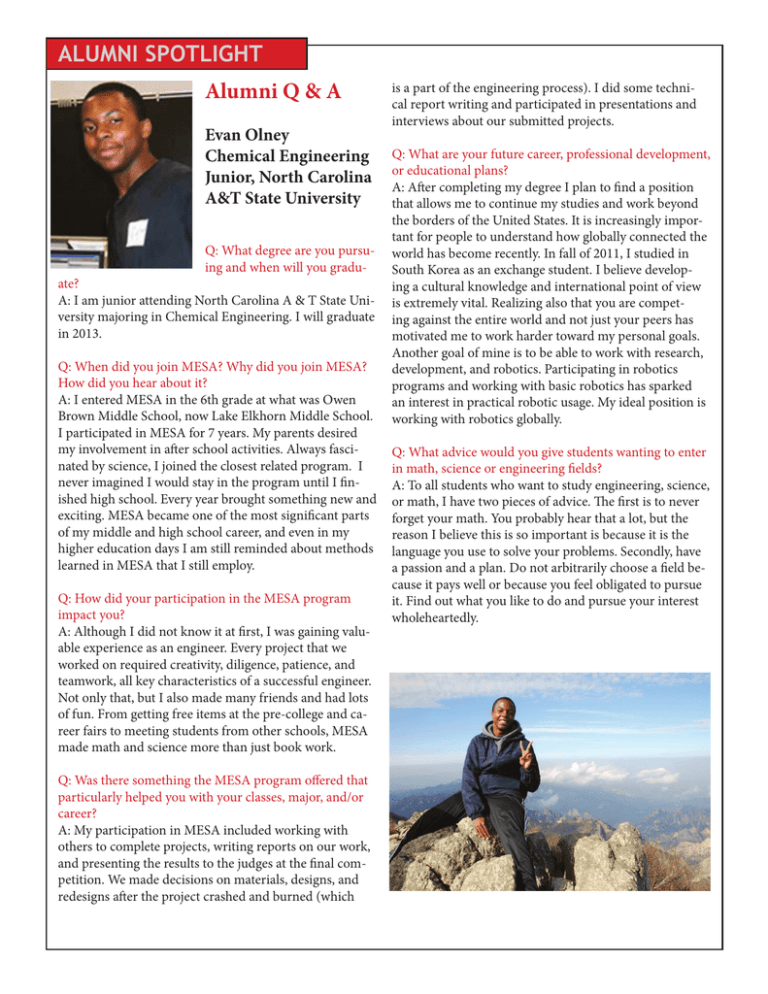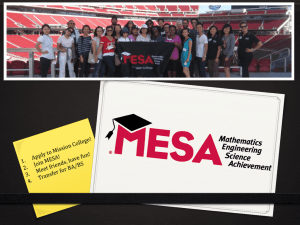Alumni Q & A ALUMNI SPOTLIGHT
advertisement

ALUMNI SPOTLIGHT Alumni Q & A Evan Olney Chemical Engineering Junior, North Carolina A&T State University Q: What degree are you pursuing and when will you gradu- ate? A: I am junior attending North Carolina A & T State University majoring in Chemical Engineering. I will graduate in 2013. Q: When did you join MESA? Why did you join MESA? How did you hear about it? A: I entered MESA in the 6th grade at what was Owen Brown Middle School, now Lake Elkhorn Middle School. I participated in MESA for 7 years. My parents desired my involvement in after school activities. Always fascinated by science, I joined the closest related program. I never imagined I would stay in the program until I finished high school. Every year brought something new and exciting. MESA became one of the most significant parts of my middle and high school career, and even in my higher education days I am still reminded about methods learned in MESA that I still employ. Q: How did your participation in the MESA program impact you? A: Although I did not know it at first, I was gaining valuable experience as an engineer. Every project that we worked on required creativity, diligence, patience, and teamwork, all key characteristics of a successful engineer. Not only that, but I also made many friends and had lots of fun. From getting free items at the pre-college and career fairs to meeting students from other schools, MESA made math and science more than just book work. Q: Was there something the MESA program offered that particularly helped you with your classes, major, and/or career? A: My participation in MESA included working with others to complete projects, writing reports on our work, and presenting the results to the judges at the final competition. We made decisions on materials, designs, and redesigns after the project crashed and burned (which is a part of the engineering process). I did some technical report writing and participated in presentations and interviews about our submitted projects. Q: What are your future career, professional development, or educational plans? A: After completing my degree I plan to find a position that allows me to continue my studies and work beyond the borders of the United States. It is increasingly important for people to understand how globally connected the world has become recently. In fall of 2011, I studied in South Korea as an exchange student. I believe developing a cultural knowledge and international point of view is extremely vital. Realizing also that you are competing against the entire world and not just your peers has motivated me to work harder toward my personal goals. Another goal of mine is to be able to work with research, development, and robotics. Participating in robotics programs and working with basic robotics has sparked an interest in practical robotic usage. My ideal position is working with robotics globally. Q: What advice would you give students wanting to enter in math, science or engineering fields? A: To all students who want to study engineering, science, or math, I have two pieces of advice. The first is to never forget your math. You probably hear that a lot, but the reason I believe this is so important is because it is the language you use to solve your problems. Secondly, have a passion and a plan. Do not arbitrarily choose a field because it pays well or because you feel obligated to pursue it. Find out what you like to do and pursue your interest wholeheartedly.
